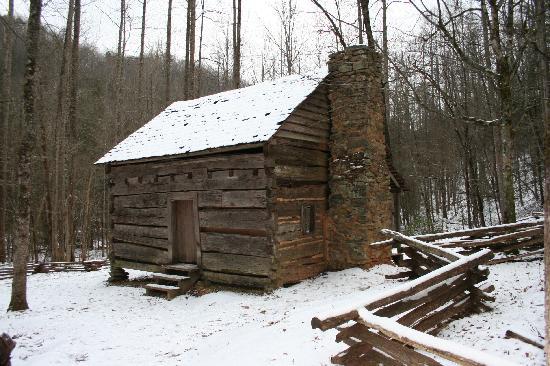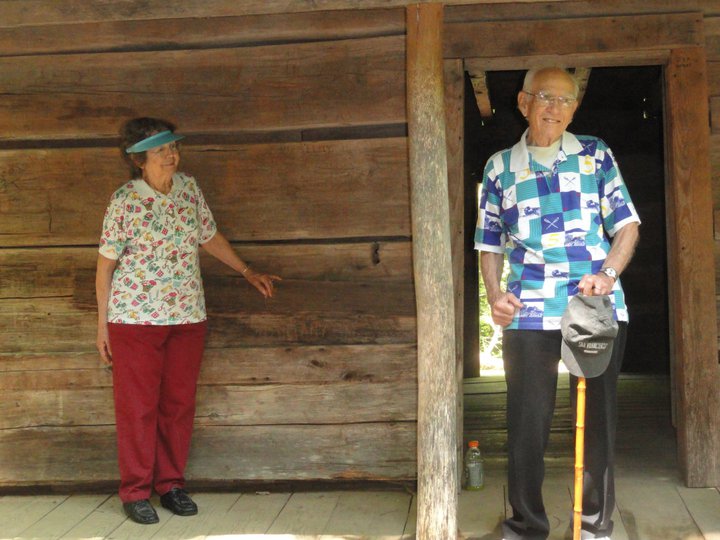
The cabin above was built by my great great grandfather in the mid 1800’s. It is one of the oldest surviving structures in Great Smoky Mountains National Park. Visiting it gave me great perspective on the toughness of my frugal ancestors. Why are some people spenders and others savers? There are definitely exceptions, but I think the values you grow up with have a lot to do with it. People ask me how I live in such “poverty.” These folks want to know what motivates me to not buy new clothes for two years or eat Brussels sprouts for lunch. To answer the question adequately, I think I need to explain my family history.
Scottish Mixed with German Equals Save Everything

The farthest I can trace my roots back is Scotland in the 1400s. Having been to Scotland, it is a beautiful but dreary place. The winters are tough, and according to the Hollywood movies I’ve seen, the English were always trying to kill you or burn your farm. Before Scottish descended immigrants started blending into the melting pot of America, they were stereotyped as being extreme tightwads, always looking for a good deal.
On the other side, I have a lot of German in me, as anyone can see if you take a look at my eyebrows. Most of my German relatives came over around the time of the revolutions in the 1840s and before. They valued education above all else. Many of them became teachers and principals in the small American towns where they settled.
The Great Depression Forever Hardens My Ancestors’ Views on Money

In 1929, my great grandfather was a successful principal of a one room school house in a small community in Alabama. He got paid by the county once the property tax collections rolled in every year at tax time. As the Great Depression hit, local property owners were unable to pay their taxes. The county, having no money to pay my great grandfather, gave him an IOU. He tried to pay his own property tax with the very script the county have given him, but they refused.
Having no liquidity after a run on the banks, my great grandfather lost the farm to a tax foreclosure. He took the family and over a half dozen kids to a new parcel of land after selling the script for a fraction of its worth. My grandfather at the time was a young lad, and seeing the whole family literally kicked to the curb because of lack of an accessible emergency fund left a deep impression on him.
Perhaps the most painful lesson of my young grandfather’s life was when he and his brother stole some watermelons from the farmer next door. Now, they figured they were not stealing as he was selling them for 5 cents and no one could pay it. The melons sat rotting in the field, so the boys figured they would help themselves. After his father found out, my grandfather got a good spanking and had to go apologize. My great grandfather refused to let any of his children take to desperate measures even though times were tough.
My grandmother’s family saw their income fall by half. My other grandmother said she felt humiliated by having to use cloth diapers because they did not have enough money for clothes. My other grandfather, who I did not know because of his death in World War 2, saw his family’s real estate holdings become virtually worthless.
Having known prosperity and then faced extreme poverty, all of my grandparents decided that money was too precious to be spent, and that banks were not to be fully trusted. They lived on a tight budget their entire lives, and saved a large percentage of their modest incomes for fear that the “next big one” was right around the corner.
“Always Get Water, Not Sweet Tea”
When I was growing up, my mom had some health complications and had to stop working. My three brothers and I were a huge financial burden, especially on a teacher’s salary. Whenever we went out to eat, it was a real treat. We only went to the cheapest restaurants in town that had kids’ menus and provided enough food to take home that if felt worth it.
My parents always sacrificed for us, but they let me know that I could not get what I wanted, but what we could afford. Hence, I never got sweet tea, my favorite drink. So I drank water because it was free. Even now that I have the money to get sweet tea, I almost always get water because it’s habit.
We never flew in airplanes, stayed in fancy hotels, or drove a nice car. However, my parents took us all over the country to national parks where we pitched tents and camped. Saturday mornings, after watching morning cartoons we had to go outside and help with the chores. I was never on a travel team, but I played baseball in the city league. I never had private lessons, but I took group classes where I learned the basics of the piano.
Eventually my mom felt comfortable to go back to work after I was mostly grown. Since I had a full scholarship for school, our family’s finances drastically improved. My brothers received much of the benefit from this, with more trips out to eat and to the movies for example. However, the lessons of growing up with five people living on a $40,000 income stayed with me permanently.
I Am a Reflection of My Frugal Ancestors, and I’m Proud Of It
I know I’m flawed. I make some financial decisions occasionally that border on cheap rather than frugal. However, I have learned from generations of my family that money is a resource to be used wisely. They taught me that we are but stewards of the gifts God has blessed us with. You should not love money, and you should not spend more than what you need to live a reasonably comfortable life. The rest should be saved for an event you do not know about one day.
My grandfather had an old edger that needed to be started with a screwdriver. After priming the machine, you had to use the screwdriver to complete the circuit between the ignition and the engine because the wire did not work anymore. He could have bought all the edgers he wanted, yet he kept using this old 40 year old piece of machinery because it did what he needed and there was no use to getting a new one. I’m grateful for the lessons he taught me about money everyday. I know I’m a little bit weird, but my ancestors needed to be to survive forging tough lives on the frontier with nothing but an axe, a gun, and a will to lead a better life.
What ways are you a reflection of your ancestors’ financial values? Do you buck the trend? Do you have mostly spenders or savers in your family or a little bit of both? Comment below!

I really liked this article!
Great article Travis. As a family historian, I liked your human interest story as well as the practical examples of living. I don’t know many people your generation or mine who can relate to this kind of thriftiness. The lessons you mentioned were thoughtful. Yes, in today’s society we throw too much away when it really could be used. We do not save money because we spend it as fast as we make it. I am hoping your article makes others think more! One more thing: your ancestor’s cabin is amazing to see!
Wow. I am a huge history nerd so I think it is really cool that you know so much about your ancestors, and that you even have pictures.
Great post!
I love this post. I admire your love of family and what you learned from them. I felt a little connection since I spent every summer in the Smoky Mountains growing up and my mom is from Alabama. I am really enjoying your site. My son told me about it (you both went to UF).
Tell Sam I said hello!